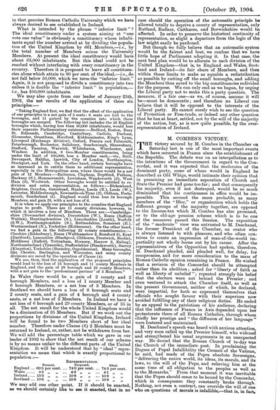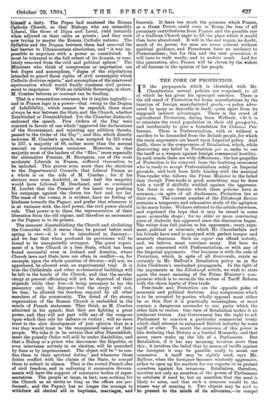T HE victory secured by M. Combes in the Chamber on
Saturday last is one of the most important events which have occurred in France since the establishment of the Republic. The debate was on an interpolation as to the intentions of the Government in regard to the Con- cordat, and it was expected that the moderates of the dominant party, some of whom would in England be described as Old Whigs, would intimate their opinion that in promising an immediate separation of Church and State the Premier had gone too far; and that consequently his majority, even if not destroyed, would be so much diminished that his continuance in office would be im. possible. This seemed the more probable, as many members of the "Bloc," or organisation which holds the different groups of the majority together, are opposed to the Income-tax which M. Combes has also promised, or to the old-age pension scheme which is to be one of the measures passed this Session. The exposition of the " moderate " view was entrusted to M. Deschanel, the former President of the Chamber, an orator who is always listened to with pleasure, and who often con- trives to create an impression of man-of-the-world im- partiality not wholly borne out by his career. After the representatives of the Opposition had spoken, therefore, M. Deschanel pleaded, and pleaded well, for delay, for compromise, and for more consideration to the mass of Roman Catholic opinion remaining in France. He wished that a revision of the Concordat should be attempted rather than its abolition ; asked for " liberty of faith as well as liberty of unbelief "; repeated strongly his belief that the electors were not behind the Premier and even ventured to attack the Chamber itself, as well at the present Government, neither of which, he declared, were impartial, for both so expressed themselves that officials who sought favour with their superiors now avoided fulfilling any of their religious duties. He ended by an appeal to the patriotism of his audience, declaring that the influence of France in Asia depended upon her protectorate there of all Roman Catholics, through whom chiefly her prestige and " the diffusion of her language " were fostered and maintained.
M. Deschanel's speech was heard with anxious attention, and very soon called up the Premier himself, who widened and strengthened his usual arguments in an unexpected way. He denied that the Roman Church of to-day was the Church of the immediate past. In proclaiming the Dogma of Papal Infallibility the Council of the Vatican, he said, had made of the Popes absolute Sovereigns, "delivering the entire world, its ideas, its morals, and its laws, to the will of the Pope, and relieving him at the same time of all obligation to the peoples as well as to the Monarchs." From that moment it was inevitable that the Popes should cease to be bound by the Concordat, which in consequence they constantly broke through. Nothing, not even a contract, can override the will of one who on questions of morals is infallible,—that is, in fact: himself a deity. The Popes had mastered the Roman Catholic Church, so that Bishops who are ostensibly Liberal, lie those of Dijon and Laval, yield instantly when adjured on their oaths as priests ; and they were now trying to master the Roman Catholic nations. The Syllabus and the Dogma between them had removed the last barrier to Ultramontane absolutism, and " it was im- passible to negotiate with a power so constituted. It must, be tolerated to the full extent of its domain, or reso- lutely removed from the civil and political sphere." The 31-misters who think of compromise or negotiation are but dupes and accomplices, " dupes of the stipulations intended to guard those rights of civil sovereignty which Catholic doctrine rejects," and accomplices of the unavowed equivocation which would finally condemn civil govern- ment to impotence. With an infallible Sovereign, in short, M. Combes believes no contract can be binding.
That is a tremendous utterance, for it implies logically— and in France logic is a power—that owing to the Dogma of Infallibility, which cannot be repealed, there must always be war between the State and the Church, whether Established or Disestablished. Yet the Chamber distinctly endorsed the speech. Five Orders of the Day were rejected in favour of one which "approved the declarations of the Government, and rejecting any addition thereto, passed to the Order of the Day" ; and this, which directly endorses M. Combes's speech, was accepted by 325 votes to 237, a majority of 88, rather more than the normal amount on contentious occasions. Moreover, in that majority most of the leaders of the "Bloc," more especially the alternative Premier, M. Bourgeois, one of the most moderate Liberals in France, suffered themselves to be included. This proves even more than the elections to the Departmental Councils that Liberal France as a whole is on the side of M. Combes ; for if his electors were even doubtful, at least half the majority would have followed M. Deschamel, and so convinced M. Loubet that the Premier of his heart was pushing his campaign against the clerics too fast and too far. The mass of the voters, it is evident, have no feeling of kindness towards the Papacy, and prefer that whenever it is at variance with the civil power, the civil power should rule. That power is to them the representative of their liberation from the old regime, and therefore as sacrosanct as the Papacy is to its priests.
The measure disestablishing the Church and abolishing the Concordat will, it seems clear, be passed before next spring is over—it is to be introduced in January— and we fear that when produced its provisions will be found to be unexpectedly stringent. The great experi- ment of a free Church in a free State, which has been found successful even in Ireland and America, where Church laws and State laws are often in conflict—as, for example, upon the whole question of divorce—will not, we apprehend, be allowed even an experimental trial. It is true the Cathedrals and other ecclesiastical buildings will be left in the hands of the Church, and that the secular clergy at present officiating will not be deprived of their stipends while they live—it being necessary to tax the peasantry only by degrees—but the clergy will not, we fear, be allowed the freedom enjoyed by all other members of the community. The dread of the strong organisation of the Roman Church is embedded in the minds of French statesmen. They think, as M. Combes admitted in his speech, that they are fighting a great power, and they will not part with any of the weapons upon which they rely for defence or victory ; will no more trust to the slow development of just opinion than in a war they would trust to the unorganised valour of their people. We take it to be certain that after Disestablish- went the priestly Order will still be under disabilities, and that a Bishop or a priest who denounces the Republic, or even intervenes actively in an election, will be punished by fines or by imprisonment. The object will be " to con- fine them to their spiritual duties," and whenever those duties conflict with the claims of the State, to compel them to submit in silence. That is the rooted French idea of civil freedom, and in enforcing it successive Govern- ments will have the support of successive bodies of repre- sentatives. The people at large, in fact, care nothing for the Church as an entity so long as the offices are per- formed; and the Papacy has no longer the courage to withdraw all clerical aid in baptisms, marriages, and funerals. It fears too much the pressure which France, as a Great Power, could exert in Rome, the loss of all pecuniary contributions from France, and the possible rise of a Gallican Church eager to fill the place which it would then have abandoned. It will in the end regain, no doubt, much of its power, for men are never content without spiritual guidance, and Frenchmen have no tendency to Protestantism ; but for this and the next generation it will have to walk warily, and to endure much. And for this generation, also, France will be cloven by the widest of all fissures in the opinion of her people.



















































 Previous page
Previous page